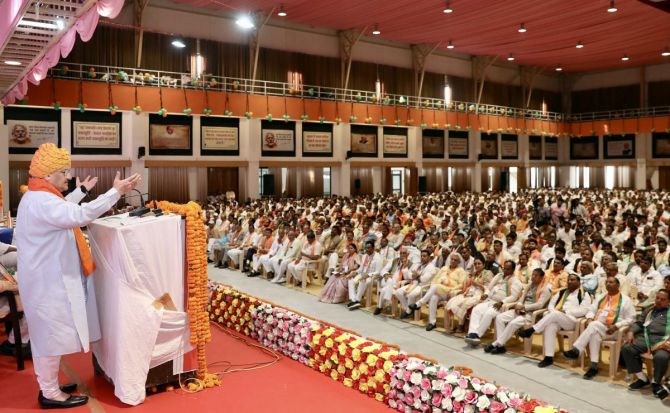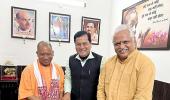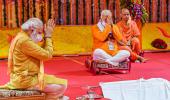For the BJP, the RSS' organisational heft is a prized asset, considering the slew of elections it faces this year, ahead of the Lok Sabha election in 2024.

A noteworthy feature of the Akhil Bharatiya Pratinidhi Sabha's three-day meeting from March 12 to 14 in Haryana's Samalkha was the absence of a cautionary note or discordant expression towards the Bharatiya Janata Party and the Narendra Modi government.
The ABPS is the apex decision-making body of the Rashtriya Swayamsevak Sangh, equivalent to the BJP's parliamentary board, and deliberates upon and seals decisions on important matters, apart from making changes in the Sangh's hierarchy.
BJP President J P Nadda and General Secretary (Organisation) B L Santhosh represented the political arm at the session, whose most significant message was the parity that had set in the RSS-BJP equation, showing that both organisations travelled a long way since the days of the first BJP coalition government, headed by Atal Bihari Vajpayee.
In Vajpayee's three tenures, including the short-lived 13-day one, the dispensation was constantly subject to the pulls and pressures of the RSS on economic and faith-related policies.
"That's because Vajpayee had to take care of the National Democratic Alliance partners who were more assertive because the BJP did not get anything close to a majority," said an RSS source.
"The BJP has a comfortable majority at the Centre, is ruling in several states, and is far better placed to implement our core ideological agenda. These circumstances have established a more comfortable equation between the Sangh and the BJP," the RSS source added.
The annual report, customarily released at the annual ABPS meet, set the background for the RSS outlook on the state of the country and its concerns.
The section titled Present Scenario, which featured towards the end of the document amounted to a political statement and stated: 'Amrit Mahotsav of national Independence was celebrated not only in the country but by Bharatiyas (Indians) living abroad... The beginning of the process of national resurgence is being experienced everywhere. Bharat's strength, modesty, and prestige are increasing.'
The RSS cited India's Group of Twenty Presidency (until November 2023), the Centre's handling of the pandemic, the economy's uptick that followed, placing it in fifth position globally, the rechristening of New Delhi's Rajpath as Kartavya Path, and the installation of Netaji Subhas Chandra Bose's statue in place of Queen Victoria's, also in the national capital, at India Gate, as 'meaningful symbols of this change'.
The BJP used these examples to meta-phrase its 'nationalist' narrative.
However, the RSS articulated its anxiety over the 'crookedness of selfish, anti-national elements'.
'The forces inimical to Bharat's unity and progress plan newer conspiracies in one way or another or to spread confusion by disseminating perverted narratives on the subjects of the country, and society has become their agenda,' stated the report.
It accused such 'forces' ('tukde, tukde gangs' in the BJP's phraseology) of 'instigating language, caste or group discords by using any situation, the event of the society as an excuse' to 'incite youths against any government scheme' like Agniveer.
Equally, it claimed that the protests by Hindus against 'Hindu girls ... being deceitfully married with an ugly plot and then exploited and/or murdered ..., illegal occupation of land in many provinces" were "demonstrations of an awakened society and indicate its self-confidence'.
Therefore, to purvey its version of 'narrative building', the ABPS decided to launch an outfit, Vimarsh, which will start working ahead of the RSS's centenary commemoration in 2024-2-25.
The significance of Vimarsh was reflected in the move to involve senior Sangh functionaries and sympathisers from the country to 'oversee the work of narrative building, countering myths and propaganda and fake news', according to a source.
Vimarsh's intent was not just to reach opinion-moulders but also Dalits, Adivasis, and backward-caste leaders and representatives, who, the Sangh felt, might be 'carried away' by 'controversies' over issues like Tulsidas' Ramcharitmanas, allegedly instigated by parties such as the Rashtriya Janata Dal and Samajwadi Party, to foster their pro-Mandal line.
Interesting facets of the Sangh emerged in the Karya Vistaar (work expansion) segment of the report, which reinforced the RSS's commitment and engagement with consolidating and expanding the network of its organisation with added focus on regions still perceived as weak.
For example, Shivamogga in central Karnataka is a stronghold of the Janata Dal -Secular. The BJP hasn't been able to breach the terrain.
The RSS began its outreach in June 2022 with the target of setting up shakhas (chapters) in the 122 mandals and 63 bastis by conducting 'Hindu Samrajya Dinotsav'.
The report claimed it had set up 225 shakhas since.
In western Maharashtra, the RSS's target was enrolling students in Pune's 12 big colleges.
The upshot, the report claimed, was that for the first time, the city's Fergusson College celebrated the birth anniversary of Shivaji.
Chhattisgarh's Korba district, Delhi's Mukherjee Nagar, and Western Odisha were named as some of the other target areas.
For the BJP, the RSS' organisational heft is a prized asset, considering the slew of elections it faces this year, ahead of the Lok Sabha election in 2024.











